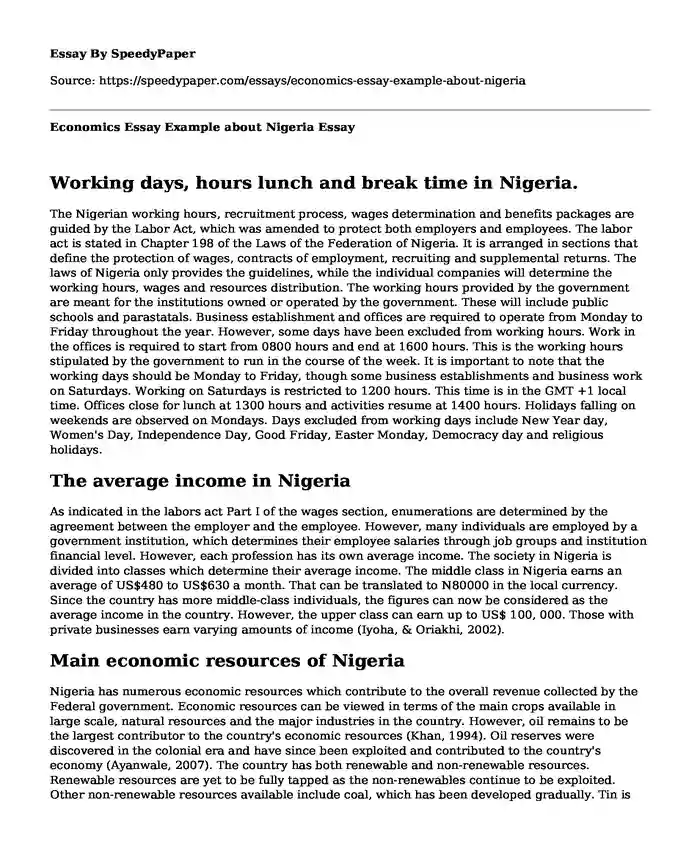Working days, hours lunch and break time in Nigeria.
The Nigerian working hours, recruitment process, wages determination and benefits packages are guided by the Labor Act, which was amended to protect both employers and employees. The labor act is stated in Chapter 198 of the Laws of the Federation of Nigeria. It is arranged in sections that define the protection of wages, contracts of employment, recruiting and supplemental returns. The laws of Nigeria only provides the guidelines, while the individual companies will determine the working hours, wages and resources distribution. The working hours provided by the government are meant for the institutions owned or operated by the government. These will include public schools and parastatals. Business establishment and offices are required to operate from Monday to Friday throughout the year. However, some days have been excluded from working hours. Work in the offices is required to start from 0800 hours and end at 1600 hours. This is the working hours stipulated by the government to run in the course of the week. It is important to note that the working days should be Monday to Friday, though some business establishments and business work on Saturdays. Working on Saturdays is restricted to 1200 hours. This time is in the GMT +1 local time. Offices close for lunch at 1300 hours and activities resume at 1400 hours. Holidays falling on weekends are observed on Mondays. Days excluded from working days include New Year day, Women's Day, Independence Day, Good Friday, Easter Monday, Democracy day and religious holidays.
The average income in Nigeria
As indicated in the labors act Part I of the wages section, enumerations are determined by the agreement between the employer and the employee. However, many individuals are employed by a government institution, which determines their employee salaries through job groups and institution financial level. However, each profession has its own average income. The society in Nigeria is divided into classes which determine their average income. The middle class in Nigeria earns an average of US$480 to US$630 a month. That can be translated to N80000 in the local currency. Since the country has more middle-class individuals, the figures can now be considered as the average income in the country. However, the upper class can earn up to US$ 100, 000. Those with private businesses earn varying amounts of income (Iyoha, & Oriakhi, 2002).
Main economic resources of Nigeria
Nigeria has numerous economic resources which contribute to the overall revenue collected by the Federal government. Economic resources can be viewed in terms of the main crops available in large scale, natural resources and the major industries in the country. However, oil remains to be the largest contributor to the country's economic resources (Khan, 1994). Oil reserves were discovered in the colonial era and have since been exploited and contributed to the country's economy (Ayanwale, 2007). The country has both renewable and non-renewable resources. Renewable resources are yet to be fully tapped as the non-renewables continue to be exploited. Other non-renewable resources available include coal, which has been developed gradually. Tin is also mined in Jos Plateau while Iron is extracted in Lokoja. Other mined minerals include gypsum, topazes, Uranium, aquamarines, barite and sapphires. It is important to note that Uranium deposits have been found in the country's northern part, but full exploitation is yet to commence (Barminas, Charles, & Emmanuel, 1998). Natural gas found in Oil reserves have also been estimated to be of significant amounts as that of zinc, columbine, lead and limestone.
References
Ayanwale, A. B. (2007). FDI and economic Growth: Evidence from Nigeria.
Barminas, J. T., Charles, M., & Emmanuel, D. (1998). Mineral composition of non-conventional leafy vegetables. Plant Foods for Human Nutrition, 53(1), 29-36.
Iyoha, M. A., & Oriakhi, D. (2002). Explaining African economic growth performance: the case of Nigeria. Revised Interim Report on Nigerian Case Study, Prepared for the African Economic Research Consortium Research Project, Explaining African Economic Growth Performance.
Khan, S. A. (1994). Nigeria: The political economy of oil.
Cite this page
Economics Essay Example about Nigeria. (2022, Sep 30). Retrieved from https://speedypaper.com/essays/economics-essay-example-about-nigeria
Request Removal
If you are the original author of this essay and no longer wish to have it published on the SpeedyPaper website, please click below to request its removal:
- Essay Sample on the Factors That Foster Success in Teams
- Essay Example on the Lululemon Company: TOWS Analysis
- L.A. Confidential - Movie Review Essay Example
- Free Essay: Communication, Facilitative, Collaborative, and Teamwork Skills
- Essay Sample Trying to Determine Boundaries to Informed Consent
- Essay Sample on Qualitative Research Case Study: Sample and Instrument
- Essay Sample on Work-Based Assessment
Popular categories





